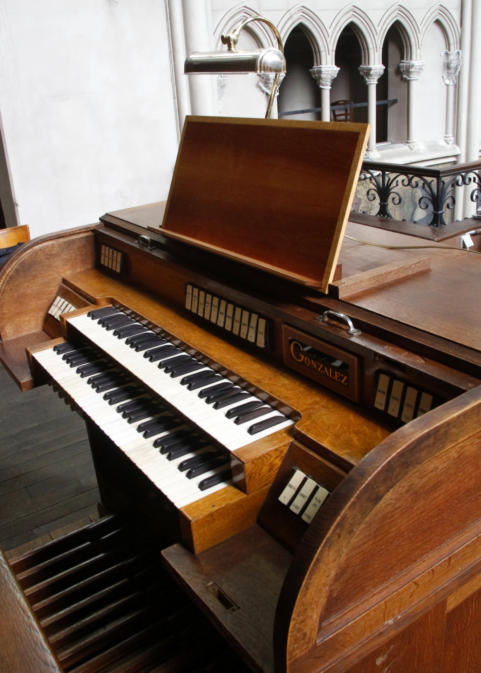


ORGANS OF PARIS © 2025 Vincent Hildebrandt HOME ALL ORGANS
Saint Joseph artisan
214, rue Lafayette, 75010 Paris




St. Joseph-Artisan Church is located on the site of an
old chapel built in 1850 by a Jesuit mission to bring
German-speaking immigrant workers spiritual support
and support for integration into French society. It was
replaced in 1865 by a church built with mainly German
and Austrian donations. In 1925, the church was
transferred to a congregation of priests close to the
world of work, and thus it became a parish under the
name "St. Joseph Artisan".
With the exception of the stained glass windows of the
choir and the aisles, the interior is illuminated by large
windows made of stained glass with fairly clear
geometric patterns that ensure a beautiful luminosity
in the nave. There are also frescoes painted on
marbled canvases above the broken lateral arches
depicting scenes from the Gospel, beautiful wooden
statues (St Joseph and St. Rita) and, in the aisles,
magnificent abstract stained glass windows, very
colorful, by the Dominican Father Kim En Joong, a
Korean painter known internationally for his paintings
and stained glass windows.
(texte français: Thierry Correard)

D2
The original organ was installed in 1851/56 by the Belgium
builder Hyppolite Loret. This organ, of which little is
known, contained ancient material, including wooden
pipes from the 8' Bourdon of the Grand-Orgue dating
back to the 18th century. In the years 1963-1965, the
organ was completely rebuilt and transformed into a neo-
classical style by Danion-Gonzalez. The traction of
keyboards and stops became electropneumatic. The
composition of the instrument was completely revised
with a decomposed Cornet and a Cromorne, at the Grand-
Orgue a Doublette and a Cornet V. The 16' Bourdon and
the 16' Bombarde of the GO were split and extended on a
Unit box spring to be played on the pedal in 16', 8' and 4'.
Moreover, it seems that the original instrument had no
independent pedal or no pedal at all. The original Swell,
once located in the upper part of the buffet, then
descended to fit into an expressive box with its additional
stops, behind the Great. However, the upper part of the
buffet, although emptied of its wind chest, has not been
removed and retains some silent front pipes in order to
preserve the original appearance of the buffet.
In 2016, Dargassies replaced the bellows and the discant
of the Montre 8 GO.

Organiste titulaire
Éric Humbertclaude
Concerts
Occasionnaly
Masses with organ
Saturday 6:00 PM: Sunday 11:00 AM
Videos
Éric Humbertclaude
Photo organ case: Jeroen de Haan
1856 - Hyppolite Loret (1)
1872 - Adrien van Bever (2)
1966 - Gonzalez (3a)
2016 - Dargassies (6)
II/27 (21) - traction électrique-
composition
The organs of Paris
ORGANS OF PARIS © 2025 Vincent Hildebrandt ALL ORGANS

D2
The original organ was installed in 1851/56 by the Belgium
builder Hyppolite Loret. This organ, of which little is known,
contained ancient material, including wooden pipes from the
8' Bourdon of the Grand-Orgue dating back to the 18th
century. In the years 1963-1965, the organ was completely
rebuilt and transformed into a neo-classical style by Danion-
Gonzalez. The traction of keyboards and stops became
electropneumatic. The composition of the instrument was
completely revised with a decomposed Cornet and a
Cromorne, at the Grand-Orgue a Doublette and a Cornet V.
The 16' Bourdon and the 16' Bombarde of the GO were split
and extended on a Unit box spring to be played on the pedal
in 16', 8' and 4'. Moreover, it seems that the original
instrument had no independent pedal or no pedal at all. The
original Swell, once located in the upper part of the buffet,
then descended to fit into an expressive box with its
additional stops, behind the Great. However, the upper part
of the buffet, although emptied of its wind chest, has not
been removed and retains some silent front pipes in order to
preserve the original appearance of the buffet.
In 2016, Dargassies replaced the bellows and the discant of
the Montre 8 GO.
Organiste titulaire
Éric Humbertclaude
Concerts
Occasionnaly
Masses with organ
Saturday 6:00 PM: Sunday 11:00 AM
Videos
Éric Humbertclaude
Photo organ case: Jeroen de Haan
1856 - Hyppolite Loret (1)
1872 - Adrien van Bever (2)
1966 - Gonzalez (3a)
2016 - Dargassies (6)
II/27 (21) - traction électrique-
composition
























